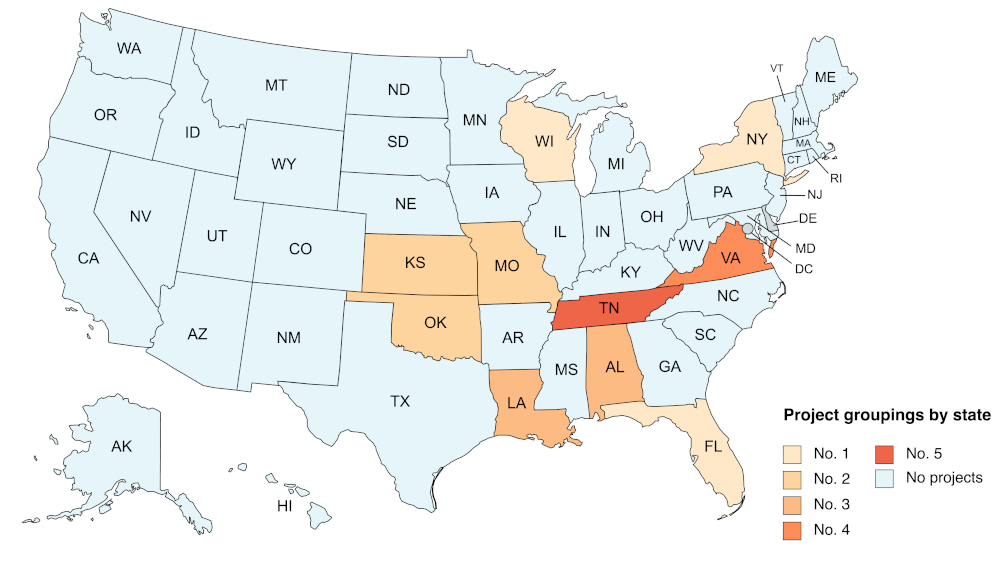More than $35 million has been granted to five hemp-specific projects under the U.S. Department of Agriculture’s “Partnerships for Climate-Smart Commodities” program.
While the projects look promising, the money is just over 1% of a total $3.1 billion USDA investment intended to support crops that reduce greenhouse gas emissions or sequester carbon – for which hemp offers an unrivaled solution.
Environmental focus
Aimed at expanding markets for commodities produced using sustainable and environmentally-friendly farming, ranching or forestry practices, the federal grant program requires recipients to match on average 50% of the USDA’s investment with non-federal funds.
The USDA program aims to “leverage the greenhouse gas benefits of climate-smart commodity production, and provide direct, meaningful benefits to production agriculture, including for small and underserved producers,” according to USDA.
Tracking benefits
The overall initiative aims to develop methods for quantifying, monitoring, reporting and verifying greenhouse gas benefits. USDA said it expects the overall Climate-Smart project to result in the sequestration of more than 60 million metric tons of carbon dioxide.
USDA said it expects the initiative to result in increased revenue streams for farmers and ranchers and support agriculture in economically distressed areas.
Focus on grain, fiber
The successful grant applications were focused primarily on hemp for grain (food), animal feed, applications for hemp hurd and technical fibers, and fuel, and support practices in nutrient management and hemp as a cover crop. The initiatives will offer producers cost-benefit analysis, financing, training, and technical and marketing support.
USDA is investing in a total 141 pilot agricultural projects that will run from one to five years under the overall $3.1 billion grant program. The money comes from USDA’s Commodity Credit Corporations.
Grants recipients
Industrial Hemp for Fiber and Grain
Aim: “to expand climate-smart markets and remedy lack of available data on environmentally beneficial practices for hemp production by providing open-accessible data and training and enabling monetization of climate-smart practices through a pilot designation in a digital marketplace.”
- Lead: Iconoclast Industries, LLC; Atlanta, Georgia
- Other partners: Cedar Meadow Farm LLC, University of Florida, University of Georgia, Stockton University, The Shaffer Group, Texas A&M University, Pecan Street Inc, CultivateAI, Florida Department of Agriculture, Green Ocean Sciences, Virginia Department of Agriculture and Consumer Services, Ganjanesh Bioscience, INDHemp, 357 Hemp Logistics, SB Friedman Development Advisors, M4MM, Canndigenous, EntreVation LLC, Stillman College, Legacy Farms Group
- States: Florida, New York, Tennessee, Virginia, Wisconsin.
- Funding ceiling: $15,000,000
Scaling Up the Industrial Hemp Supply Chain as Carbon Negative Feedstock for Fuel and Fiber
Aim: “to provide effective valuation and monetization of environmental services, including carbon dioxide removal via implementation of new genetics and management practices to increase sustainability of hemp as an annual crop in the U.S.”
- Lead: Lincoln University
- Other partners: National Hemp Association, Kansas Farmers Union, Missouri Farmers Union, Missouri Organic Association, National Association for the Advancement of Colored People, Oklahoma Black Historical Research Project, Oklahoma Farmers Union, ShowMe State Hemp Association, Missouri Department of Agriculture, Donald Danforth Plant Science Research Center, Oklahoma State University, Prairie View A&M Univ., St. Louis Univ., Southeast Missouri State Univ., Univ. of Missouri, Benchmark Design, Cquester Analytics, DTE Materials, HempWood, Midwest Natural Fiber, New West Genetics, REA Resource Recovery Systems, Rockwater, Renaissance Fiber
- Primary States Expected: Kansas, Missouri, Oklahoma, Texas
- Funding Ceiling: $5,000,000
A Comprehensive Evaluation of the Impact of Industrial Hemp (Cannabis sativa) and Soil Microalgae Consortiumas High-Efficiency Carbon Sequestration Model Plants: Implications for Climate Change and Soil Improvement
Aim: to grow and market hemp in the southeastern United States as a high efficiency carbon sequestration . . . commodity crop.” Under this project, “The National Hemp Growers Cooperative, LLC plans “to buy all industrial hemp from all farmers during the duration of the grant.”
- Lead: Florida A&M University
- Other partners: Florida Agricultural and Mechanical University (FAMU), Alabama A&M University, Southern University, University of Florida (UF-IFAS)
- States: Alabama, Florida, Louisiana
- Funding Ceiling: $4,990,000
Sustainable Agricultural Solutions to Plastic Pollution
Aim: “To evaluate industrial hemp bioplastics, develop software to calculate the environmental impact of a new feedstock and identify climate-smart market opportunities.” The project will also “provide financial and technical assistance for climate-smart practices including cultivation of hemp as a cover crop, and other rotational crop trials.”
- Lead: PlantSwitch, Inc., Dallas, Texas
- Other partners: Ag Processing Solutions, Brian Furnish, Leistritz Extrusion, Extrusion Technology and Innovation, Plant Based Products Council, SmartFarm Innovation Network, Tillery Sims. Virginia Department of Agriculture and Consumer Services, Virginia Cooperative Extension, Virginia Polytechnic Institute and State University, Virginia State University, Virginia Sustainable Agriculture Research and Education
- States: Virginia
- Funding Ceiling: $4,940,000
Climate-Smart Fiber Hemp: A Versatile Thread Connecting the Nation’s Underserved Farmers, Climate Change Mitigation and Novel Market Opportunities
Aim: “Expand the production of industrial hemp . . . , evaluate its greenhouse gas benefits (GHG), and promote the value of market development to a cross-section of production agriculture, including small, medium, and underserved producers across the state of Tennessee, including “30 counties at risk for becoming economically distressed.”
- Lead: Tennessee State University
- Other Partners: Tennessee State University, Hemp Alliance of Tennessee, University of Tennessee Institute of Agriculture, Tennessee Department of Agriculture, The Tennessee New Farmer Academy, based at Tennessee State University
- States: Tennessee
- Funding Ceiling: $4,972,800
Hemp is among crops included in an additional three broader agricultural initiatives funded by the Climate-Smart program.

